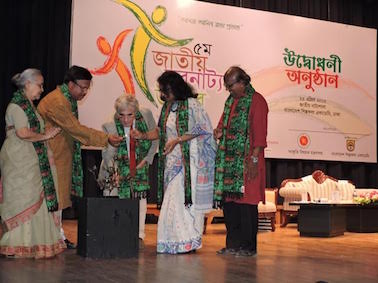Don’t hold your breath!
Written by: Lubna Marium
Posted on: Sunday 8th of May 2016 12:24:39 AM

Arts Gaze by Lubna Marium
‘Cultural action is an intervention in daily life, directed to the transformation of social consciousness.’ - K.N. Panikkar
While attending the eight-day National Youth Theatre Festival 2016, from May 23rd, organized by the People's Theatre association at Bangladesh Shilpakala Academy, I was informed that the mortal remains of LGBT activist, Tanay Fahim, hacked to death the preceding day, was being brought to the National Auditorium there. While the Shilpakala premises buzzed with young theatre activists, male and female, from all over the country, I could hear sporadic discussions in hushed tones, about the horrific events where Tanay, also a theatre practitioner, had lost his life. The cruel happening was in no way consonant with the liberal and progressive atmosphere we were part of, there and then. Hordes of activists paid their last respect to a dear member of their community. The murder certainly was not a reflection of who we are as a nation.
Without going into detailed speculation, of which enough is going on, about the who and why of Tanay's murder, I would like to state that as a nation we do have a problematic political situation and we do have security issues, but certainly Bangladesh is one of the few Muslim majority nations which has an assimilative, plural and liberal culture. That niches of extremism are present means that we need to do more to erase them.
I met Hiranmay Karlekar in 2005, just after his infamous book 'Bangladesh: The Next Afghanistan' was published, and out rightly told him, 'It's not going to happen'. I met him again in 2013 after the Hefazat-e-Islam fiasco, and he said, 'I told you so!’ Once again I said with conviction, 'This is spurious and is going to fizzle away.' Today, even after the brutal hackings of liberal thinkers, I would assuredly like to advice people, waiting for Bangladesh to disintegrate into the throes of aggressive religious extremism and radicalization, 'Don't hold your breath!'
So, what gives me the strength to say so, with confidence? I walk Bangladesh and walking I observe the inner strength of a multicultural community of people carrying on its shoulders a couple of thousand years of cultural practices. More so within rural Bangladesh with its varied and plural performative practices such as the 'Kobi-gaan', or musical debates on issues of religion, caste and much more; 'lathikhela', or secular martial arts; the Pachalis, or tales, of the Saints and of Manasa, the Hindu Serpent Goddess revered by the Muslims of Bangladesh. It is present too within the squalor of our urban centers. 'Where?’ you may well ask. Within your rickshaw puller, or the young mason building your concrete edifices, humming the age-old songs from these incredible folk tales.
'Why don't we hear them?'
'You are not listening', I say.
While the world is seeking ways to counter the twin paradoxes of 'globalization', and 'obscurantism', Bangladesh little realizes that it is sitting on its very own secret armament to fight these phenomena.
As 'globalization' is bent upon gobbling up all plural practices with its 'mantra' of consumerism, the strongest manifestation of 'obscurantisms' is the rise of religious extremism. The 'Empire' lures people with the message of the market, sent out by transnational capital. This pipe dream of the market is a long way from people living below poverty level, or in lands where they cringe as shunned minorities. As the social scientist K.N. Panikkar, so eloquently states, ' The market is becoming so irresistibly powerful that consumerism tends to be the ideology and culture of the masses, creating material aspirations not commensurate with their real situation. The anxieties generated by this contradiction form the ground in which religiosity and communalism thrive. That many see a solution to their personal crises in spirituality is also part of this syndrome.'
It is at this juncture of conflict that cultural action can direct the increasingly alienated individual towards a positive path. Fortunately our rural cultural practices do just that.
Our rural practices have been incorporated into communities like the People's Theatre Association that, since its inception 26 years ago, has organized eight children’s theatre festivals, while the four previous youth theatre festivals were held in 2008, 2009, 2011 and 2014. The association currently represents a total of 262 troupes from across the country. There is substantial representation from minority communities and too of female theatre activists.
However, we surely need to do more. Maybe to strengthen and support existing practices, all over the country, is the need of the day.
Leave a Comment:
Read what others says about us
- documenting for posterity
- performing transformation
- cherishing tradition
- the body speaks anew
- in conversation with two shadhona dancers
- gidree bawlee: empowerment through art
- in conversation with shadhona dancer sinthia yasmin nupur
- don’t hold your breath!
- #freetagore
- history of rhythm, in pixels
- of monsoons, myths and manasa
- culture: the present site for struggle
- the art & politics of documentation
- and, theatre strikes back!
- lest we forget: atiśa
- dancing away boundaries
- dance-why?
- haha
- hhh
- heked
Advertisement #1

Advertisement #2

Advertisement #3
